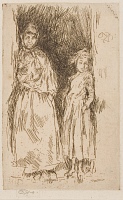Bohemians | ||
| Number: | 486 | |
| Date: | 1901 | |
| Medium: | etching and drypoint | |
| Size: | 86 x 53 mm | |
| Signed: | butterfly at upper right | |
| Inscribed: | no | |
| Set/Publication: | no | |
| No. of States: | 3 | |
| Known impressions: | 5 | |
| Catalogues: | K.442; M.440 | |
| Impressions taken from this plate (5) | ||
KEYWORD
doorway, child, tavern, wine-seller, woman.
TITLE
There are considerable variations in titles, as follows:
'Bohemians' (1900, Whistler). 2
'Bohemians, Corsica' (1902, Edward Guthrie Kennedy (1849-1932)). 3
'The Hole in the Wall Ajaccio' (1903, Rosalind Birnie Philip (1873-1958)). 4
'Le trou du mur, Ajaccio. - Bohemians (Hole in the Wall, Ajaccio. - Bohemians)' (Paris, 1905). 5
'Bohemians, Corsica', also known as 'Hole in the Wall, Ajaccio' (1909, Howard Mansfield (1849-1938)). 6
Whistler's original title, 'Bohemians' is the generally accepted title.
'Bohemians' (1900, Whistler). 2
'Bohemians, Corsica' (1902, Edward Guthrie Kennedy (1849-1932)). 3
'The Hole in the Wall Ajaccio' (1903, Rosalind Birnie Philip (1873-1958)). 4
'Le trou du mur, Ajaccio. - Bohemians (Hole in the Wall, Ajaccio. - Bohemians)' (Paris, 1905). 5
'Bohemians, Corsica', also known as 'Hole in the Wall, Ajaccio' (1909, Howard Mansfield (1849-1938)). 6
Whistler's original title, 'Bohemians' is the generally accepted title.
3: Kennedy 1902 (cat. no. 360) 'Bohemians, Corsica'.
4: R. B. Philip for Whistler, to R. Dunthorne, [17 June 1903], GUW #13042.
5: Paris Mem. 1905 (cat. no. 431).
6: Mansfield 1909 (cat. no. 440).
The alternative title, 'The Hole in the Wall, Ajaccio', referred to a site rather than to the models. A hole in the wall might refer to a house, shop or tavern that was little more than a 'hole in the wall'. The name was familiar to Londoners. There were several old London taverns with the name 'Hole in the Wall', including ones off Chancery Lane, Hatton Garden, Fleet Street, Queen's Square, and Berkeley Square. 7
7: London Postal Directory.
DESCRIPTION
An old woman stands to left and a young girl to right, in a dark doorway. The woman wears a scarf tied under her chin, a loose cloak or shawl over her shoulders and reaching to just below her waist, and a long skirt. The bare-foot child is in a long-sleeved dress.
SITTERS
The title 'bohemians' suggests that the figures may be gypsies or travelling people.
SITE
Whistler made at least four etchings in Ajaccio, capital of Corsica. The 'hole in the wall' may have been a lodging house, or a tavern, and the title may reflect Whistler's memory of similar sites in Victorian London.
DISCUSSION
The subject, concentrating on only two figures, is comparable to Marchande de Vin, Ajaccio [485]. It harks back to some of Whistler's earlier works, where an older woman and child are placed together in a doorway, and particularly to another image of the poor, The Beggars [190], reproduced below. 8
8: See Hopkinson 2009c, p. 66.


